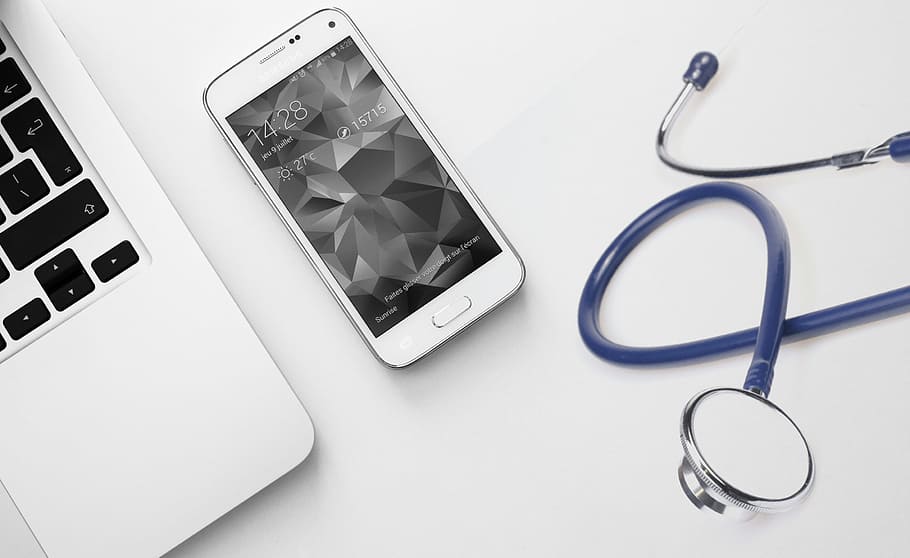Healthcare apps and devices help us keep track of our health. It sounds nice to improve the healthcare industry by working with those tools, doesn’t it? If you want to be part of it, then work as a health informatics specialist, just like me!
Today, I will share my journey on how to become a health informatics specialist. You can explore what to learn and which skills to develop. So what are you waiting for? Let’s dive in together!
What Is Health Informatics?
Health informatics is the process of using technology to improve healthcare services. In this area, people often take advantage of computer data to perform healthcare tasks.
For example, doctors and nurses can help patients see their health data online thanks to technology. They can also make personalized plans for treatment.
Health informatics specialists are professionals in this industry. More specifically, they analyze medical data and oversee the process of gathering the data. Then, they can provide helpful insights to drive medical improvements.

What Do Health Informatics Specialists Do?
Health informatics specialists do lots of important tasks every day. Their goal is to help technology run well in hospitals and clinics.
As a health informatics specialist, I have many things to deal with. For example:
- Setting up technology: I decide where to set up the computers, machines, and other gadgets. Then, doctors and nurses can use them easily to care for patients.
- Exploring technology: I also explore and study different computer systems and devices. After researching, I suggest the best options to use in healthcare.
- Checking technology: Once I’ve found out the new technologies, I have to check them first to ensure they are suitable for healthcare providers.
- Improving technological solutions: Technology is constantly evolving. Thus, as a health informatics specialist, I’m in charge of improving the way doctors do their jobs by upgrading the systems. I also create special programs for their tasks.
- Training: I’m a tech expert, but healthcare providers may not be able to use technology properly. Hence, I train them on how to work with the devices.
- Data collection: I deal with important patient data every day. Then, based on the numbers and facts, I figure out ways to improve healthcare.
- Monitoring data flows: I also oversee how patient information travels across digital networks.
How To Become A Health Informatics Specialist?
The journey to becoming a health informatics specialist is long. So, I will divide it into six steps to help you picture it easily.
Step 1: Complete Your Bachelor’s Degree
The first step to take is to study. There are various learning paths, but obtaining a bachelor’s degree may be the best option. Why so?
Employers like their employees to have this degree because it shows that they have learned about the major. Hence, their expertise can help with their job.
Plus, when studying a subject, you can explore the ins and outs of it. You also have chances to discuss the core concepts deeper with your classmates.
If you want to become a health informatics specialist, find a major in data analytics or computer science. They are all relevant to your future job.
It’s also helpful to know a bit about medical terminologies. You can learn about how the human body works and some different medicines. Then, you can communicate with doctors better. Working with medical data will be easier, too.

Step 2: Pursue Professional Certification
You can also get certificates. Just like degrees, they prove that you are proficient in certain jobs. You can consider the AHIC (Advanced Healthcare Informatics Certification).
The AHIC certification enables you to demonstrate your commitment and competence to your career. When studying for it, you can discover health informatics knowledge deeper. You must be excited to apply what you’ve learned to the real world when finishing the course.
Step 3: Develop Your Skills
Working as a health informatics specialist is challenging. But things become easier for you if you have all the skills below.
Technical skills
Let’s talk about technical skills first! They refer to how well you handle your technical tasks with your knowledge. Here is what you need to work on:
- Computer programming
There are many complicated tasks when handling healthcare data. To maximize your productivity, you should develop computer software to automate them.
For example, the application of artificial intelligence (AI) in healthcare is becoming widespread. This cutting-edge technology can be an excellent assistant when you get stuck with complex processes.
You can also use AI to automate repetitive tasks. Then, you will have more time for other duties.
- Data analytics
Data analytics is one of the most important skills to hone because you will work with data all day as a health informatics specialist.
You may act as a detective for numbers. You also look at lots of data and find patterns in the database. After hours of analyzing, you can develop solutions to help hospitals work better.
- Healthcare IT
This skill focuses on understanding health technology. Please note that this field is huge, so you need to work really hard.
The first things to study are medical data systems and EHR (Electronic Health Records). You will encounter these concepts almost every day at work.
Other technologies like telemedicine and patient portals are important, too. Although doctors use these devices more often, you are the ones that ensure their operation.
- Management
When you move to the senior or executive levels, you have a team to run. But higher positions mean more responsibilities. Thus, you need project management skills to excel in your role.
Soft skills
Soft skills are interpersonal skills. They help you work and interact with other people easily.
- Analytical thinking
You use your analytical thinking skills to analyze the data. Once you get the insights, you will recommend the best solution for developing and improving.
This skill requires technical competency. It’s similar to the technical skills I have mentioned in the previous section. But you should also be a strategic decision-maker.
- Communication
A health informatics specialist covers the IT and healthcare aspects. Thus, if you choose this job, you will be the bridge between different parties.
For example, you communicate with doctors and healthcare providers to understand their needs for technology. You also need to explain the technological concepts in an easy-to-understand way.
After discussing with the doctors, you meet with your development team. Together, you brainstorm ideas and plan the development process.
- Curiousity
Even when you have become a health informatics specialist, do not stop learning. This field is always changing. So learning is the best way to remain competitive.
- Organization
You have to deal with a huge database. There can also be many projects at the same time. Hence, you will be stressed if you don’t know how to manage your time and organize your things.
- Ethics
Patient data is the center of your job. But please note that it must be private and confidential. Thus, you need to be very careful and respectful.
Ethics is also about honesty. You must be ethical and honest when recommending healthcare and patient care policies after your data analytics.

Step 4: Prepare Your Resume
A resume is simply a document that summarizes your education, skills, and experience. It shows employers that you are suitable for the job.
When you apply for a health informatics specialist, you will submit your resume first. Then, the employers will check your info. If they like it, they will contact you and invite you to an interview.
The resume is the first thing that the company knows about you. So, try to make it outstanding yet honest.
Your resume includes your name and contact info. You also talk about your education, like what school you went to and what major you studied.
Aside from those basic details, share some specific things. For example, you can show off your skills. Then, explain how they help with the job.
Mention your work experience, too. This section is about sharing what you did and what you learned from it.
The appearance of your resume is important as well. So try it to make it look clean and easy to read. You can also use headings like “Education” and “Experience.” They make your resume organized.
Before sending your resume, read it again carefully. Spelling and grammar errors will make it messy.

Step 5: Try Internships
The resume is ready. You can use it to apply for an internship. It’s when you spend time working in a real place, like a healthcare center or a company.
This job is temporary. Plus, you don’t get paid well when working as an intern due to your lack of experience. However, you can receive more than that.
First, you get to work with professionals in the industry. They will teach you many things that you can’t learn at school.
Second, you have a chance to earn hands-on experience. It will totally differ from what you see in books or movies.
And finally, you can expand your network. Trust me; they can help you greatly in the future, especially when looking for job opportunities.
Step 6: Apply For A Job
The last step is to look for a job and apply for it. You can find job openings on websites like Glassdoor and LinkedIn.
You can also ask your friends, teachers, or family if they know about any chances. Remember that I told you about networking? Now, it’s time to take advantage of your network.
Don’t forget to update your resume. After the internship, you have many things to mention there. Then, send it to the employer and wait for a call.

Career Outlook
In 2023, health informatics specialists can earn about $79,596 per year. Their hourly pay is approximately $38.27.
The high demand for this job is another benefit. According to the Bureau of Labor Statistics, these jobs can grow by about 17% from now to 2031. That’s a big increase! It means you will have more job opportunities.
One reason for this growth is that more and more hospitals use computers to handle their medical data. Thus, they need experts to assist them. It’s where health informatics specialists come in.

What Is The Work Environment Like For Informatics Specialists?
Your workplaces are regular offices with computers. You use these smart devices to keep track of medical information and develop programs.
I’m working as a full-time health informatics specialist. This nine-to-five job requires me to work from morning until afternoon.
But sometimes, I work overtime in case of an emergency. When such a thing happens, I have to skip my holidays and weekends. You will experience all of those things when working in this role.

How Can Health Informatics Improve Health Care?
Health informatics can help improve the healthcare industry in many ways. That’s why this job is on the rise.
You should explore what you can bring to the field. Then, it will be a big motivation for you to become a health informatics specialist.
Quick information sharing
Before, doctors and nurses had to exchange papers to know what was going on with a patient. But with health informatics, they can share information fast. Hence, they take care of patients quicker.
Data storage
Health informatics helps organize and store patient data. Since you have everything on your computer, you can find it easily. In other words, this approach saves time and resources, like space and paper.
Safer health care
As a health informatics specialist, you can help doctors connect personal health data with their patient’s medical records. Then, the patients can get the right care and stay safe.
Continuous development
This industry is still growing. Plus, after years of studying and working, you can come up with new ideas to help improve it.

Conclusion
You can become a health informatics specialist once you are confident about your skills and experience. Then, you will be ready to join this field.
The learning path is full of challenges. But remember that you are contributing to the development of healthcare. So feel proud of what you do!
Thank you for reading!
